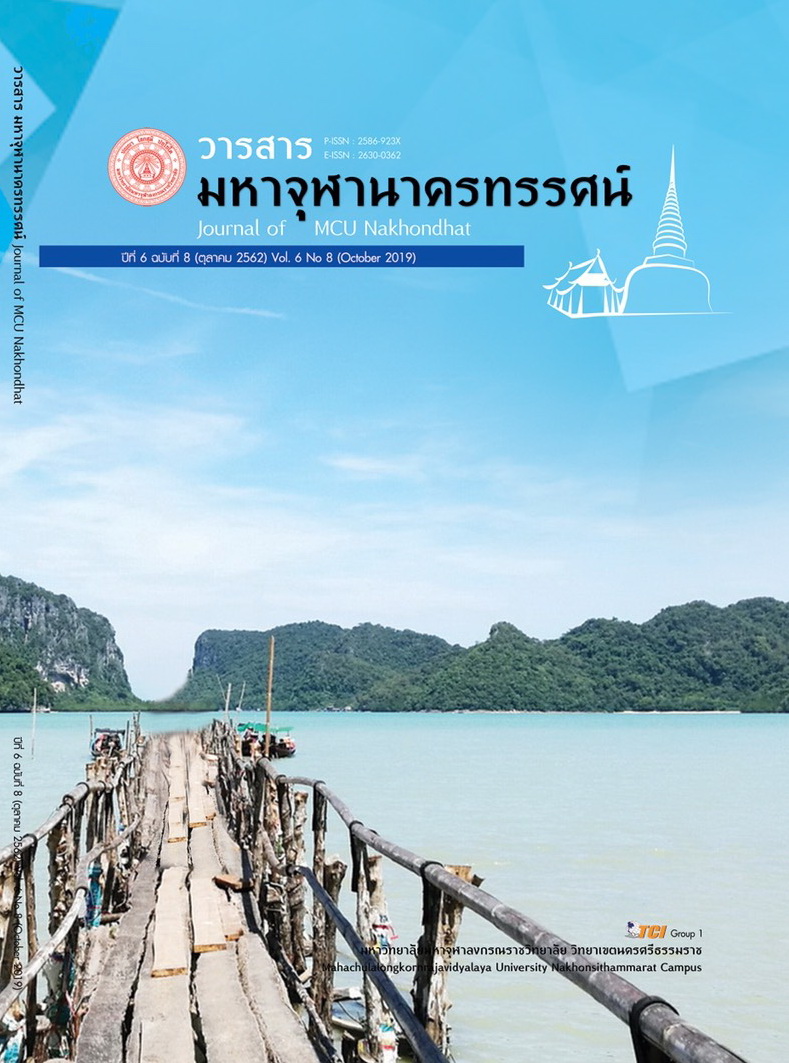THE ENVIRONMENTAL CONSERVATION IN BUDDHIST WAYS OF HIS MAJESTY KING BHUMIBOL ADULYADEJ (RAMA IX) : THE ANALYSIS BASED ON PRINCIPLES OF BUDDHISM
Main Article Content
Abstract
The objectives of this research were 1) to study the environmental conservation of his majesty King Bhumibol Adulyadej 2) to study the environmental conservation in Buddhism 3) to integrate into the environmental conservation as Buddhist ways. This research is qualitative; The data was gained from documents for analysis and conclusion
The results of the research provided that:
- King Bhumibol Adulyadej has several methods of environmental conservation to conserve soil, water, forest, and air. His methods of environmental protection were maintaining environmental qualities, restoring environments, and encouraging environmental scarcities or the lack of sufficient available natural resources to meet the demands; moreover, to be developed the country in several ways. This environmental conservation by reference from his experiences studying including with the royal duties, and his remarkable ability that became to the distinctive identity of well-known as he received special commendations from people in global.
- Buddha has several methods of environmental conservation in (Sikkhàpada) a disciplinary rule or rule of morality that mentioned to do not destroy the nature of soil, water, forest, and air etc., and the Buddha preached about the natural environment for a variety of benefits together with not harmful to the environment to his disciple by referring to environment of life and living on Middle Way" or "The Middle Path as it could be support the healthiness, and the mental health. Furthermore, carrying to the way leading to liberation on each person.
- The integration of Buddhism by following principles of Buddhism. For instance, the (Ariyasacca) the Noble Truth, (RachSaïgahavatthu) principles for king to take care of his people, (Santuññhi, Santosa) contentment, (Magga) the Noble Eightfold Path, (Sikkhàttaya) the Threefold Learning, (Sàràõãyadhamma) states of conciliation or virtues for fraternal living, and also following the methods of environmental conservation of King Bhumibol Adulyadej. It could conserve, restore the environment more effectively. In the same way, people have moral principles to proceed with work that achieve amazing results as a concept that “Good men, Remarkable work and high moral standards”.
Article Details
How to Cite
(กุยรัมย์) พ. จ. (2019). THE ENVIRONMENTAL CONSERVATION IN BUDDHIST WAYS OF HIS MAJESTY KING BHUMIBOL ADULYADEJ (RAMA IX) : THE ANALYSIS BASED ON PRINCIPLES OF BUDDHISM. Journal of MCU Nakhondhat, 6(8), 4076–4094. retrieved from https://so03.tci-thaijo.org/index.php/JMND/article/view/214714
Section
Research Articles
References
คณะกรรมการ กปร. (2561). โครงการอันเนื่องมาจากพระราชดำริ. เรียกใช้เมื่อ 3 กุมภาพันธ์ 2561 จาก https://th.wikipedia.org/wiki/โครงการอันเนื่องมาจากพระราชดำริ
ประพันธ์ ศุภษร. (2561). พระวินัยกับการอนุรักษ์สิ่งแวดล้อม. เรียกใช้เมื่อ 17 มิถุนายน 2561 จาก https://www.mcu.ac.th/article/detail/427
พระพรหมคุณาภรณ์ (ป.อ.ปยุตฺโต). (2551). พจนานุกรมพุทธศาสตร์ ฉบับประมวลธรรม. (พิมพ์ครั้งที่ 15). กรุงเทพมหานคร: บริษัท เอส.อาร์. พริ้นติ้งแมสโปรดักส์ จำกัด.
มรกต กำแพงเพชรและสวรรยา ธรรมอภิพล. (2560). หลักการจัดการสิ่งแวดล้อมเพื่อการพัฒนาที่ยั่งยืนตามแนวทางของพระบาทสมเด็จพระเจ้าอยู่หัว. วารสารธุรกิจปริทัศน์, 9(2), 192-201.
มหาจุฬาลงกรณราชวิทยาลัย. (2539). พระไตรปิฎกภาษาไทย ฉบับมหาจุฬาลงกรณราชวิทยาลัย. กรุงเทพมหานคร: โรงพิมพ์มหาจุฬาลงกรณราชวิทยาลัย.
ราชกิจจานุเบกษา. (2593). พระราชพิธีบรมราชาภิเษก ระหว่างวันที่ 4-8 พฤษภาคม พุทธศักราช 2493. เรียกใช้เมื่อ 22 กรกฏาคม 2561 จาก https://th.wikipedia .org/wiki/พระราชพิธีบรมราชาภิเษก_พุทธศักราช_2493
ว.วชิรเมธี. (2555). อหิงสามรรคาสู่สันติภาพ. (พิมพ์ครั้งที่ 1). กรุงเทพมหานคร: มหาวิชชาลัยเศรษฐศาสตร์.
สมเด็จพระพุทธโฆษาจารย์ (ป.อ.ปยุตฺโต). (2561). พจนานุกรมพุทธศาสน์ ฉบับประมวลศัพท์. (พิมพ์ครั้งที่ 31). กรุงเทพมหานคร: โรงพิมพ์ สหธรรมิก จำกัด.
สุวิทย์ ภาณุจารี และลัดดา ผลวัฒนะ. (2559). พระบาทสมเด็จพระปรมินทรมหาภูมิพลอดุลยเดชกับธรรมาภิบาลแนวพุทธ. วารสารสถาบันวิจัยญาณสังวร มหาวิทยาลัยมหามกุฏราชวิทยาลัย, 7(1), 135-148.
อำภา พิชิตการค้าและอาจารย์พระสัทธัมมโชติกะ ธัมมาจริยะ. (2537). ผู้ปรารถนาพระปัญญาธิกสัมมาสัมพุทธเจ้า ผู้วางรากฐานหลักสูตรการเรียนการสอนพระอภิธรรมในประเทศไทย (พิมพ์ครั้งที่ 1). กรุงเทพมหานคร: โรงพิมพ์มหาจุฬาลงกรณราชวิทยาลัย.
ประพันธ์ ศุภษร. (2561). พระวินัยกับการอนุรักษ์สิ่งแวดล้อม. เรียกใช้เมื่อ 17 มิถุนายน 2561 จาก https://www.mcu.ac.th/article/detail/427
พระพรหมคุณาภรณ์ (ป.อ.ปยุตฺโต). (2551). พจนานุกรมพุทธศาสตร์ ฉบับประมวลธรรม. (พิมพ์ครั้งที่ 15). กรุงเทพมหานคร: บริษัท เอส.อาร์. พริ้นติ้งแมสโปรดักส์ จำกัด.
มรกต กำแพงเพชรและสวรรยา ธรรมอภิพล. (2560). หลักการจัดการสิ่งแวดล้อมเพื่อการพัฒนาที่ยั่งยืนตามแนวทางของพระบาทสมเด็จพระเจ้าอยู่หัว. วารสารธุรกิจปริทัศน์, 9(2), 192-201.
มหาจุฬาลงกรณราชวิทยาลัย. (2539). พระไตรปิฎกภาษาไทย ฉบับมหาจุฬาลงกรณราชวิทยาลัย. กรุงเทพมหานคร: โรงพิมพ์มหาจุฬาลงกรณราชวิทยาลัย.
ราชกิจจานุเบกษา. (2593). พระราชพิธีบรมราชาภิเษก ระหว่างวันที่ 4-8 พฤษภาคม พุทธศักราช 2493. เรียกใช้เมื่อ 22 กรกฏาคม 2561 จาก https://th.wikipedia .org/wiki/พระราชพิธีบรมราชาภิเษก_พุทธศักราช_2493
ว.วชิรเมธี. (2555). อหิงสามรรคาสู่สันติภาพ. (พิมพ์ครั้งที่ 1). กรุงเทพมหานคร: มหาวิชชาลัยเศรษฐศาสตร์.
สมเด็จพระพุทธโฆษาจารย์ (ป.อ.ปยุตฺโต). (2561). พจนานุกรมพุทธศาสน์ ฉบับประมวลศัพท์. (พิมพ์ครั้งที่ 31). กรุงเทพมหานคร: โรงพิมพ์ สหธรรมิก จำกัด.
สุวิทย์ ภาณุจารี และลัดดา ผลวัฒนะ. (2559). พระบาทสมเด็จพระปรมินทรมหาภูมิพลอดุลยเดชกับธรรมาภิบาลแนวพุทธ. วารสารสถาบันวิจัยญาณสังวร มหาวิทยาลัยมหามกุฏราชวิทยาลัย, 7(1), 135-148.
อำภา พิชิตการค้าและอาจารย์พระสัทธัมมโชติกะ ธัมมาจริยะ. (2537). ผู้ปรารถนาพระปัญญาธิกสัมมาสัมพุทธเจ้า ผู้วางรากฐานหลักสูตรการเรียนการสอนพระอภิธรรมในประเทศไทย (พิมพ์ครั้งที่ 1). กรุงเทพมหานคร: โรงพิมพ์มหาจุฬาลงกรณราชวิทยาลัย.


